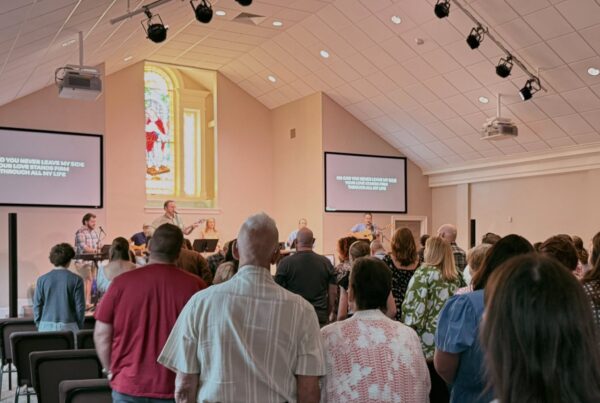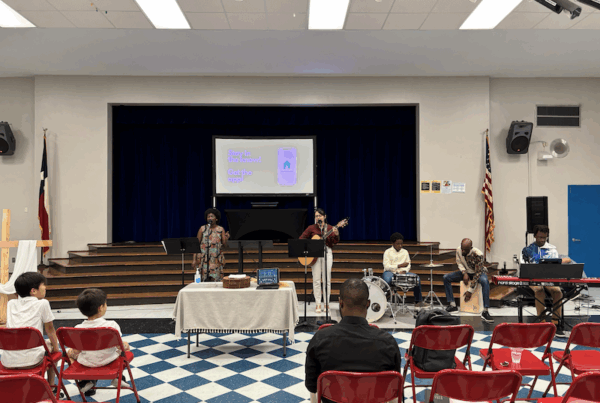“The heart cannot love what the mind does not know.” A few years ago, I read these words in Jen Wilkin’s book, Women of the Word. Over time, her words have established a quiet residency in my mind. And in moments when my heart is cold and indifferent toward the Lord, they remind me of the connection between my poor affections for God and my shallow knowledge of God.
In a culture that encourages us to give our emotions primacy in all things, Jen Wilkin counters that message with a simple truth that many are hesitant to accept: “If we want to feel deeply about God, we must learn to think deeply about God.”
Recently, I got to meet with Jen through Zoom and ask her questions for our Acts 29 global community. Church leaders thinking through how to plant healthy, multiplying churches filled with people who love the Lord will greatly benefit from Jen’s wisdom on confronting Bible illiteracy and prioritizing theological education in the local church.
A Little About Jen
I asked Jen to describe herself in three words and she chose, “optimistic, home body, and nerd.” I asked how her family would describe her and she replied, “I texted my kids, and they said I’m conscientious, creative, and witty, and my husband calls me his companion and ally.” Jen and her husband, Jeff, have been married for almost 30 years and have four children in their twenties. They’re also enthusiastic pug owners! They’re members of The Village Church in Flower Mound, Texas, where they both serve faithfully. Jeff teaches and leads worship in the children’s ministry and Jen teaches women’s Bible studies, serves on the Institute (theological training program) team, and is the executive director of Family and Next Gen Ministries (birth to grade 12).
One of the biggest missteps the church has taken with regard to Christian education is to continually lower the bar.
Why Bible Literacy Is Important to Jen
Jen’s Twitter profile includes the phrase, “Advocate for Bible literacy.” Considering the myriad of issues that need championing, I wanted to know why she was so passionate about Bible literacy. Growing up, Jen’s family attended seven different denominational churches. She said, “I saw a lot of different people standing behind a podium teaching from the same book, but they weren’t all teaching the same thing. I realized sooner rather than later that if you get it wrong, it’s really destructive. This drives a lot of my desire for Bible literacy to be normative.” Jen believes Bible literacy is a timeless and glaring need in our churches. “You never reach the end of talking about it. There’s always someone else who needs to hear it. But we can’t transmit a faith we don’t know.”
Helping Women View Themselves as Theologians
In Knowing God, J. I. Packer wrote, “Every time we mention God we become theologians, and the only question is whether we are going to be good ones or bad ones.” Jen said, “Women need to be reminded that the command to love God with their mind is equally incumbent on them as it is on men.” She explained how when women gather, we often bring “the feels.” We get real with each other. But we seldom move beyond feelings-level conversations.
Jen has spent years urging and equipping women to know the Scriptures. She said, “Women often have a derivative understanding of the Bible that had been handed to them by others who were the experts, and I want to diminish the expert-amateur divide.” She wants women to be partners in the learning process and become better thinkers, not just receivers of information.
Dangerous Trend in Churches
Jen laments how churches often feel like they should apologize for asking people to learn. She said we must “challenge people to learn, knowing that learning translates into right thinking. Right thinking begets right feeling and right doing.” She believes one of the biggest missteps the church has taken with regard to Christian education is to continually lower the bar.
Young adults are leaving the church at alarming rates. A recent Lifeway study reported that the number one factor for kids staying in church after they leave home is whether or not they learned to read the Bible.
She explained how low standards and promises of little commitment won’t attract people. People invest their time and energy in what they think is important. All the other things people commit to are saying they’re worth it. People won’t value theological training because they can tell we don’t value it either. Churches need a more compelling message. We must convictionally think this is important. We must be evangelists for this.
Starting Points for Developing Theological Training
Jen encouraged church planters to “Assess what the spaces you have for discipleship are currently accomplishing. Consider whether a new learning environment will be seen as competing or partnering with other environments. Ask yourself, ‘Do we have any dedicated environments where the highest stated purpose is learning?’ Consider how you’re going to message a learning environment in relation to the messaging that you’ve done about these other spaces.”
She suggested church leaders think hard about how they’re going to implement theological education and to pilot it with a small group of people first. “Think about who you know who is an expert in a subject matter, and rely on connections you’ve made through seminary, Acts 29, etc. You don’t have to reinvent the wheel; adapt what others are doing. There are so many great resources out there. Learn to curate good content for your church.”
Developing Theological Training for Kids and Teens
When thinking through developing kids and youth theological training, she challenged church leaders to ask, “What do you want a high school senior to know if they were to leave your church?” Developing a strategy around your answer to that question is important. She explained that young adults are leaving the church at alarming rates. A recent Lifeway study reported that the number one factor for kids staying in church after they leave home is whether or not they learned to read the Bible.
Obstacles to Implementing Theological Training
Jen warned that some of the biggest hurdles church planters will face in implementing an effective Christian education system in their churches will be buy-in and gaining trust. People will need to believe this is worth their time. This begins with a well-conceived plan. Jen also explained how in many church plants, the highest stated goal is community. Small group is king! We need spaces where the highest stated goal is learning. Over the last few decades, an anti-intellectualism sentiment has crept into many churches. But loving God with our minds is part of the enlightening work of the Spirit through the Word.
Why Bible Literacy Should Matter to Planters
I asked Jen why church planters should care about theological education in the local church as much as she does. She said, “Because of the forgotten phrase in the Great Commission. We’re not only called to make disciples but to teach them to obey God’s Word. And we can’t teach what we don’t know. The very essence of the Great Commission rests on us transmitting teaching to other disciples who then make disciples.” She shared this great Dallas Willard quote: “We [should] intend to make disciples and let converts happen instead of intending to make converts and let disciples happen.”
We’re not only called to make disciples but to teach them to obey God’s Word. And we can’t teach what we don’t know. The very essence of the Great Commission rests on us transmitting teaching to other disciples who then make disciples.
Jen explains in Women of the Word what’s at stake: “Bible literacy matters because it protects us from falling into error. Both the false teacher and the secular humanist rely on biblical ignorance for their messages to take root, and the modern church has proven fertile ground for those messages. Because we do not know our Bibles, we crumble at the most basic challenges to our worldview.” May we, as a diverse, global community committed to planting healthy, multiplying churches join Jen Wilkin in championing the worthy cause of Bible literacy.











